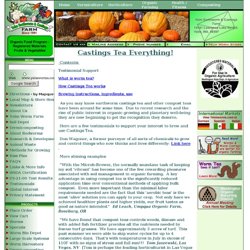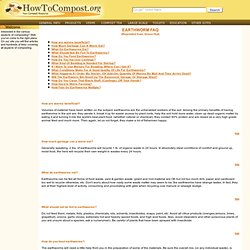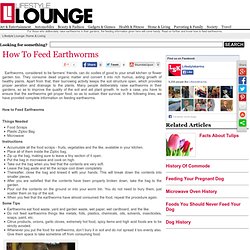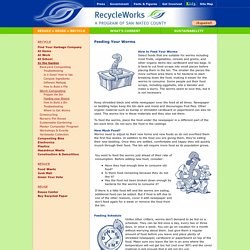

Worm Castings & Soils. As you may know earthworm castings tea and other compost teas have been around for some time.

Due to recent research and the rise of public interest in organic growing and planetary well-being they are now beginning to get the recognition they deserve. Here are a few testimonials to support your interest to brew and use Castings Tea. Don Wagoner, a former purveyor of all sorts of chemicals to grow and control things who now thinks and lives differently : Link here . More shining examples: “With the Microb-Brewer, the normally mundane task of keeping my soil ‘vibrant’ has become one of the few rewarding pleasures associated with soil management in organic farming. “We have found that compost teas controls weeds, disease and with added fish fertilizer provides all the nutrients needed by fescue turf grasses.
“The compost tea used in my vineyard has worked particularly well. “We were looking for a way to suppress turf grass disease without using fungicides. Top Foliar Spray/Wash: Ingredients: Vermiculture products worm culture systems UK. Untitled. Volumes of material have been written on the subject; earthworms are the unheralded soldiers of the soil.

Among the primary benefits of having earthworms in the soil are: they aerate it, break it up for easier access by plant roots, help the soil hold more water, clean up dead organic matter by eating it and turning it into the world's best plant food, (whether natural or chemical), they contain 60% protein and are raised as a very high grade animal feed and much more. Then again, let us not forget, they make a lot of fishermen happy. Generally speaking, 2 lbs. of earthworms will recycle 1 lb. of organic waste in 24 hours.
In absolutely ideal conditions of comfort and ground up, moist food, the herd will recycle their own weight in wastes every 24 hours. Earthworms can be fed all forms of food waste, yard & garden waste, (plant and root material are OK but not too much dirt), paper and cardboard too wet to recycle otherwise, etc. Avoid soaking or flooding the food. How to Feed Earthworms - Information on Feeding Earthworms - Earthworm Feeding Tips. Earthworms, considered to be farmers’ friends, can do oodles of good to your small kitchen or flower garden too.

They consume dead organic matter and convert it into rich humus, aiding growth of healthy plants. Apart from that, their burrowing activity keeps the soil structure open, which provides proper aeration and drainage to the plants. Many people deliberately raise earthworms in their gardens, so as to improve the quality of the soil and aid plant growth. In such a case, you have to ensure that the earthworms get proper food, so as to sustain their survival. In the following lines, we have provided complete information on feeding earthworms. How to Feed Earthworms Things Needed Food Scraps Plastic Ziploc Bag Microwave Instructions Accumulate all the food scraps - fruits, vegetables and the like, available in your kitchen. Some Tips Earthworms eat food waste, yard and garden waste, wet paper, wet cardboard, and the like. Feeding Your Composting Worms. Keep shredded black and white newspaper over the food at all times.

Newspaper or bedding helps keep the bin dark and moist and discourages fruit flies. Other organic material such as burlap or shredded cardboard or paperboard can also be used. The worms live in these materials and they also eat them. To feed the worms, place the food under the newspaper in a different part of the bin each time. Do not bury the food in the castings. Worms need to adjust to their new home and new foods so do not overfeed them the first few weeks. Unlike other critters, worms don't demand to be fed on a schedule. Happy redworms will eat half their weight in food every day. Because worms have no teeth, they need to take in grit with their food.
Pulverized eggshells are an excellent source of grit. Problem: Moldy food Solution: If you have fed the worms too much, the food might become moldy. Problem: Offensive odor Solution: Uneaten food has become anaerobic.